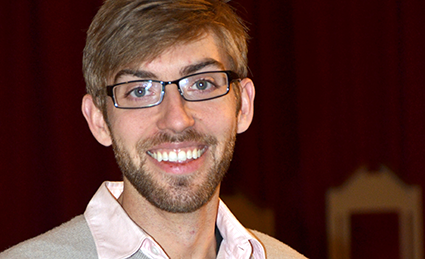
Campus Ministry at Univ. of Maryland is about relationships

By Erik Alsgaard
UMConnection Staff
The Rev. Brett Pinder has the coolest office in the Baltimore-Washington Conference. Sure, Bishop Marcus Matthews has the big corner suite at the Conference Mission Center, and there are offices throughout the Conference with views of lakes, rivers, valleys and parking lots.
But Pinder has a spiral staircase in his office.
And a loft.
Pinder, since July 1 of last year, has been the United Methodist chaplain on campus at the University of Maryland in College Park.
His office sits in Memorial Chapel, one of about a dozen or so rooms for ecumenical campus ministry that happens here.
Pinder, a Provisional Elder, is a 2011 graduate of Wesley Theological Seminary in Washington, D.C., and this is his first time serving as a campus minister.
He is “on loan” from the Peninsula-Delaware Conference, he said, where he served in parish ministry at two churches, both half-time: Perryville UMC in Perryville, and as associate pastor in Elkton.
When his wife became a graduate student at UMBC, Pinder began to look for an appointment in the Baltimore-Washington Conference. At one point, he spotted the opening for campus ministry at the university, and applied.
In the few months since landing on campus, Pinder said that he has learned several differences between parish work and campus ministry, but also several similarities.
One of the key similarities is the importance of relationships.
“Just getting together with students for coffee or lunch has been very important,” he said. “The students’ relationships among themselves and with the Wesley Foundation are very important, too. I think students are looking for a place to belong. I think creating a place that fosters building relationships is a real need.”
Pinder said that he’s been surprised by how busy the students are.
“What has been surprising is the weight of students’ schedules,” he said. “I think this school is like many others, where it draws students who try to find a competitive edge. It’s surprising how hard it can be for students to carve out time for different things.”
One of the big differences?
“The students I work with don’t fund the ministry, we do,” Pinder said. “They can support some of them: we go hiking, they can pay the fees to get in the park; we may go on a ski trip, they can probably do that. They’ll do some fundraising to go on a mission trip this coming spring. But a lot of the ongoing things, they’re just not in a position to pay for.”
The Baltimore-Washington Conference, through its office of Connectional Ministries, supports the ministry of Pinder and three other campus ministries: at American University, Howard University, and Frostburg State University.
“Providing opportunities for these young adults to grow in their faith and discipleship is an essential ministry of the BWC,” said Sandy Ferguson, the Conference Director of Connectional Ministries. “But we don’t limit our outreach to just these four campuses. We encourage any local church that is near a college or university to be reaching out to the students in their communities. The college years can be a time of life when people especially need God and, as the church, we want to be there for them.”
At Maryland, Pinder offers a main worship service on Wednesday nights, and a fellowship time Thursday evening. The worship experience seems to make him smile.
When he preaches, it’s not a typical sermon. Rather, Pinder writes discussion questions and helps facilitate a conversation among the students. He has tried to keep the worship services to under an hour, but because of these conversations, most worship services run 90 minutes or more.
“They wrestle with many of the same issues we wrestle with,” he said. “I’m not sure students are searching for answers so much as taking up the questions. Not that they’re not trying to find answers.”
Pinder said that the students designed the worship service several years ago.
“They get most engaged around … the conversation, especially if it is something theological or scriptural,” he said. “They’ve really engaged in searching for meaning in the text.”
SECOND OF A FOUR-PART SERIES ON
CAMPUS MINISTRY IN THE
BALTIMORE-WASHINGTON CONFERENCE
Pinder said that churches located close to campus ministries could help support them by building relationships with the ministry and finding out what the students particular needs are, whether that be trying to offer intergenerational opportunities of service or fellowship.
“The campus ministries are the place that cares for the young adults when they’re away from their home churches,” he said, “providing safe places for students to explore what faith is about. It’s a real important time for them.”
For any congregation, keeping in prayer the young adults who surround the campus ministries is great support. Financial support is also always welcome.
What brings Pinder the most joy? He pauses.
“I really have a heart for designing worship services,” he said, “and the fact that the students really get engaged in the worship service brings me the most joy in my ministry.”

Login/Register to leave comment